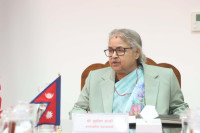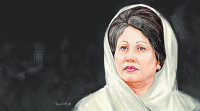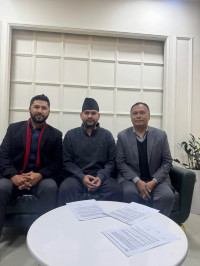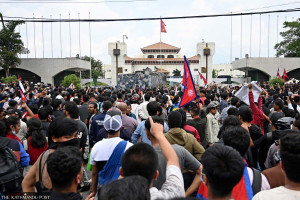Opinion
Speaking in tongues
Although my native tongue is Nepal Bhasa, listening to the news in it feels like listening to a foreign language
I am in China at the moment, and when people here ask me if my mother tongue is Nepali, I explain to them that it is in fact Nepal Bhasa (Newari). However, I am far from fluent in it, and my vocabulary is limited. I have never learned how to write in the Ranjana script, and sometimes listening to the news in Nepal Bhasa is almost like trying to comprehend a foreign language.
Perhaps I myself am to blame for my incompetence. I know that I have not really made an effort to learn the language from my parents or my grandparents. But perhaps the unitary state model and the Nepali education system are also blameworthy. The Nepali state has not really made it a point for me to learn my mother tongue. In school, I was not offered an option to learn it. A few friends who spoke Nepal Bhasa at home and spoke Nepali with an accent were often ridiculed.
Problematic definition
When education was first made available to the masses after the fall of the Rana regime, it was exclusively in the Nepali language. This meant that to gain access to knowledge, people had to adopt a language which they did not necessarily feel ownership of.
The trend of the course books being written mostly in Nepali and English continues till date. Although a few government schools do provide children with the option of learning their mother tongue and so books are published in various languages of the country, only a very few children benefit from it. Public schools follow the curricula in Nepali, even in places where the majority of children do not speak it as a first language. In their book ‘Freakonomics’, Dubner and Levitt argue—and provide empirical evidence for it—that children do well in school when they are taught in the language their parents speak at home. Maybe this is one of the reasons why, despite having almost universal primary enrolment, dropout rates are frighteningly high in Nepal.
Adopting the language of the ruling elite was for decades the exclusive path to a better future in Nepal. It still is to a large extent. The bureaucracy in the country has been functioning in Nepali since its inception, and currently, in its composition, over 80 percent are speakers of Nepali as a first language and of Khas-Arya origin, a group that comprises only about 30 percent of Nepal’s population. I also find it quite absurd that a certain multinational company operating in Nepal makes its communication (print and radio advertisements) available in languages like Awadhi, Bhojpuri, Maithili and even Nepal Bhasa, while the country’s constitution is hard to get in these languages. This is rather hypocritical for a country that prides itself in being multilingual. In Nepal’s modern history, the ability to speak what has come to be known as the Nepali language and a complexion that is a certain shade of brown encompass the definition of being a Nepali. That is a problematic definition.
Changing times
The country is in the process of being federalised and the promulgation of the new constitution should have marked a new beginning for Nepal, but I fear we are still far from a new and better beginning. The challenge ahead for Nepal is to undo several historical wrongs without fuelling ethnocentrism and subsequent hate, which an ethnicity-based federalism is bound to do. A thorough understanding of and respect for the true sentiments of the people is required.
For a state that has preached assimilation throughout its modern history—with only token amendments in the past decade—and has derived most of its power from the politics of exclusion, overcoming this challenge is of paramount importance if it wants to create a Nepal that is mindful of and respectful towards its multiple identities. Doing so will require treading paths that may seem uncomfortable to some, but these paths will define Nepal for decades, if not centuries, to come.
Joshi is pursuing a master’s in International Relations and Diplomacy at Tribhuvan University




 5.4°C Kathmandu
5.4°C Kathmandu









%20(1).jpg&w=300&height=200)

